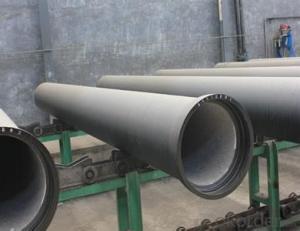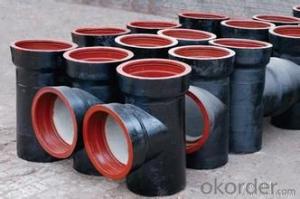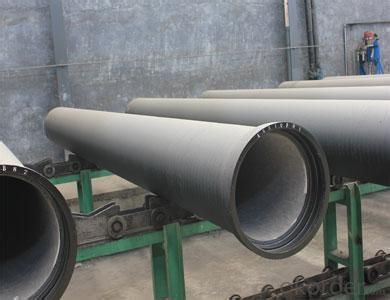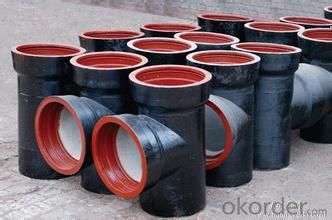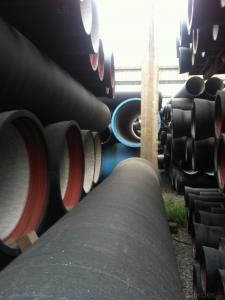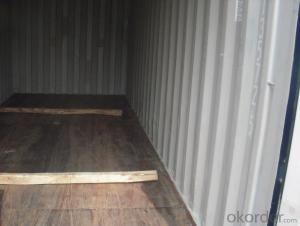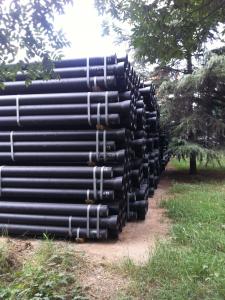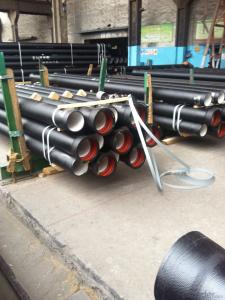DUCTILE IRON PIPE AND PIPE FITTINGS K7 CLASS DN300
- Loading Port:
- Tianjin
- Payment Terms:
- TT OR LC
- Min Order Qty:
- 23 pc
- Supply Capability:
- 3000 pc/month
OKorder Service Pledge
OKorder Financial Service
You Might Also Like
· Material : Ductile Cast Iron
· Size Range : DN 80mm to DN 2000mm
· Unit Effective Length : 6m or 5.7m
· Manufacture Standard: ISO 2531:1998/ EN 545:2006/EN 598:2007
· Annual capacity : 200,000 tons
· Coating Exterior: Zinc 130g/m2 according to ISO 8179-1 and bitumen coating 70 microns.
· Cement Interior: Portland Cement/ High Alumina Cement/ Sulphate Resisting Cement Lining according to ISO 4179
· Special requirements on external coating and internal lining can be applied
· We also provide accessories such as SBR/EPDM rubber gaskets, lubricant paste, pipe caps, PE sleeves, etc.
Additional Parts:
Each pipe is strictly inspected according to related standard to ensure permanently high performance.
Easy Installation at site and service free for life
Long Service Lifespan
Quotation will arrive you within 24hours once we get your inquiry.
We guarantee offering you a competitive price.
A copy of original inspection reports of pipes will be offered after shipment.
Photos of loading process will be sent to the customer after shipment effect.
We will follow-up the delivery progress after shipment effect and update to the customer on weekly basis.
- Q: Are ductile iron pipes suitable for irrigation systems?
- Ductile iron pipes are a great fit for irrigation systems. They are renowned for their durability, strength, and resilience, which makes them an excellent choice for various applications, including irrigation systems. These pipes are capable of withstanding high water pressure and are resistant to corrosion, ensuring the efficiency and longevity of the irrigation system. Furthermore, ductile iron pipes have a smooth interior surface that minimizes friction and allows for efficient water flow, guaranteeing optimal operation of the irrigation system. In addition, these pipes have a long lifespan, reducing the need for frequent replacements and maintenance, making them a cost-effective option for irrigation systems. In conclusion, ductile iron pipes are highly suitable for use in irrigation systems due to their durability, strength, corrosion resistance, and efficient water flow.
- Q: What are the different types of coatings available for ductile iron pipe?
- The different types of coatings available for ductile iron pipe include cement mortar lining, polyethylene sleeving, polyurethane coatings, and epoxy coatings. Each coating offers specific benefits such as corrosion resistance, improved flow characteristics, and protection against external elements.
- Q: Can ductile iron pipe be used for water supply to remote areas?
- Yes, ductile iron pipe can be used for water supply to remote areas. Ductile iron pipes have excellent strength and durability, making them suitable for long-distance water transmission. They can withstand high pressure and are resistant to external loads and impacts, making them ideal for rugged terrains and remote areas where maintenance and repairs can be challenging. Additionally, ductile iron pipes have a protective lining that prevents corrosion and ensures the water remains safe for consumption. Therefore, ductile iron pipes are an efficient and reliable choice for water supply to remote areas.
- Q: Does the cast iron pipe need separate corrosion protection?
- Ductile iron is characterized by its ease of decay and deformation, so if it is not a particular requirement, there is no need to do it alone
- Q: Can ductile iron pipe be used for industrial applications?
- Yes, ductile iron pipe can be used for industrial applications. Ductile iron pipes are known for their durability, strength, and resistance to corrosion, making them suitable for various industrial settings. They can handle high-pressure and heavy-duty applications, making them ideal for industries such as water and wastewater, oil and gas, and chemical processing.
- Q: Can ductile iron pipes be used for water supply networks?
- Yes, ductile iron pipes can be used for water supply networks. Ductile iron pipes are known for their strength and durability, making them suitable for carrying water over long distances. They are resistant to corrosion and can withstand high pressure and external loads, making them a reliable choice for water supply systems. Additionally, ductile iron pipes have a smooth internal surface, which reduces friction and allows for efficient water flow. Overall, ductile iron pipes have been widely used in water supply networks around the world due to their excellent performance and longevity.
- Q: How does ductile iron pipe compare to steel pipe in terms of durability?
- Ductile iron pipe is generally considered to be more durable than steel pipe. It has superior strength and durability due to its unique microstructure, which allows it to withstand higher levels of pressure, impacts, and loads. Ductile iron pipe also has better corrosion resistance properties, making it less prone to rust and deterioration compared to steel pipe. Additionally, ductile iron pipe has a longer lifespan and requires less maintenance, making it a more reliable and durable choice for various applications.
- Q: What is the cost of ductile iron pipe compared to other pipe materials?
- The cost of ductile iron pipe can vary depending on factors such as size, length, and project requirements. Generally, ductile iron pipe tends to be more expensive than alternatives like PVC or HDPE pipes. Ductile iron pipe is renowned for its strength and durability, making it suitable for water distribution, wastewater systems, and industrial piping. Its robustness and longevity contribute to its higher cost compared to other materials. In contrast, PVC and HDPE pipes are often more affordable due to lower production and material costs. They are also lightweight, easy to install, and resistant to corrosion, resulting in cost savings during installation and maintenance. While ductile iron pipe may have a higher upfront cost, its superior strength and longevity can lead to long-term savings by reducing the need for frequent repairs or replacements. The choice of pipe material should consider project requirements, budget constraints, and the expected lifespan of the infrastructure.
- Q: Can ductile iron pipes be used for underground hydropower systems?
- Yes, ductile iron pipes can be used for underground hydropower systems. Ductile iron pipes are known for their strength and durability, making them suitable for various applications, including underground installations. They have excellent resistance to corrosion and can withstand high pressure, making them ideal for carrying water in hydropower systems. Ductile iron pipes also have a long lifespan, reducing the need for frequent replacements and minimizing maintenance costs. Additionally, they have good joint integrity, ensuring leak-free connections underground. Therefore, ductile iron pipes are a reliable choice for underground hydropower systems.
- Q: How are ductile iron pipes protected from external damage?
- Ductile iron pipes are protected from external damage through the application of protective coatings. These coatings act as a barrier, shielding the pipes from corrosion and other forms of external damage. Additionally, the pipes may be encased in concrete or installed in a casing pipe to provide further protection against external forces and impacts.
Send your message to us
DUCTILE IRON PIPE AND PIPE FITTINGS K7 CLASS DN300
- Loading Port:
- Tianjin
- Payment Terms:
- TT OR LC
- Min Order Qty:
- 23 pc
- Supply Capability:
- 3000 pc/month
OKorder Service Pledge
OKorder Financial Service
Similar products
Hot products
Hot Searches
Related keywords
